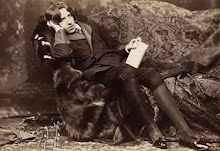
They both lived in the same era, were aesthets who worshipped Art, were doomed to a secret love life, and are deemed among the top authors and poets of their time. Oscar Wilde and Konstandinos Kavafis never met but "the similarities between Dorian Grey and Kavafis' poems are astounding" as Efi puts it. Read her work here.
"Είναι εκπληκτικές οι ομοιότητες ανάμεσά τους" παρατήρησε το μέλος της Αναγνωστικής Λέσχης που ανέλαβε τη σύγκριση χωρίων του Ντόριαν Γκρέυ και ποιημάτων του Καβάφη. Η Έφη το αποδίδει στη ν εποχή τους, την κρυφή τους ζωή, στον αισθητισμό τους. Διαβάστε εδώ.
ν εποχή τους, την κρυφή τους ζωή, στον αισθητισμό τους. Διαβάστε εδώ.
 ν εποχή τους, την κρυφή τους ζωή, στον αισθητισμό τους. Διαβάστε εδώ.
ν εποχή τους, την κρυφή τους ζωή, στον αισθητισμό τους. Διαβάστε εδώ. In the February 2009 issue of the enewspaper DIA TAUTA, we found an article on Romania's national poet Michail Eminescu, Wilde's and Kavafis contemporary man of literature. His verses are heroic and patriotic, he has a force and a social vision the other two poets wouldn't share.Read Costas' Papageorgiou translation of the article here. Catch a glimpse of Eminescu's wonderful world of poetry below, in the musical score of Hyperion.
Στο τεύχος του Φεβρουαρίου 2009 της τοπικής εφημερίδας ΔΙΑ ΤΑΥΤΑ, βρήκαμε άρθρο για τον σύγχρονο του Ουάιλντ και του Καβάφη, Μιχαήλ Εμινέσκου, ο οποίος κινείται περισσότερο στο κλίμα του Βαλαωρίτη και του Σολωμού, διαπνεόμενος από ηρωϊκό ιδεώδες και πατριωτισμό, οραματιζόμενος την κοινωνική δικαιοσύνη, γι' αυτό είναι και ο εθνικός ποιητής της Ρουμανίας.Δείγμα της ποιητικής του μαγείας η ενορχήστρωση του "Υπερίων" που ακολουθεί.

















2 comments:
true is they have a lot of commons as the fact that they are fully connected with erotism,worryies about humman being and a try to forward this to the readers too(kavafis through his writtings,dorrian through his personality as it seems on the book)so oscar ouaild(via the mask of dorian gray) and konstantinos kavafis have a lot of common indeed,maybe another thing we can say they had in common is that they had a secret life as their sexual habits that was forbidden at their times.
Thank you, Helen, for the article that you upload here about Mihai Eminescu. He is indeed one of the most important poets of our small culture (there are critics who tells that he is the greatest). I don't know what is written about him in that column but all people know that he was not inlove with the Greeks (Fanariots). But I think all can be explained by political issues at that moment.
Post a Comment